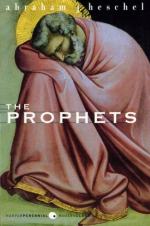
|
| Name: _________________________ | Period: ___________________ |
This test consists of 5 multiple choice questions, 5 short answer questions, and 10 short essay questions.
Multiple Choice Questions
1. What is the origin of pathos?
(a) Hebrew.
(b) Islamic.
(c) Greek.
(d) Egyptian.
2. What is the ultimate purpose of ecstasy?
(a) Knowledge of one's self.
(b) Apathy.
(c) Union with the divine.
(d) Pathos.
3. Another theory regarding the inspiration of the prophets regarded the prophetic act as what?
(a) An act of madness.
(b) An act of unconsciousness.
(c) An act of poetic creation.
(d) An act of rebellion.
4. Heschel contends that the prophets were in what state of mind when they received God's call?
(a) State of consciousness and awareness.
(b) State of ecstasy.
(c) State of madness.
(d) State of passivity.
5. Who declared ecstasy to be a definitive mark of a prophet?
(a) Alexander.
(b) Aristotle.
(c) Philo.
(d) Plato.
Short Answer Questions
1. What did God do after the prophet proclaimed the destruction of Nineveh and the people repented?
2. Heschel says that Moses would have taught what kinds of rules of right living to the people?
3. What is Karma?
4. One view that Heschel discusses is that an outstanding feature of a poet's consciousness is the sense of being what at the moment of inspiration?
5. From the total perspective, what does Heschel say are demands rather than fulfillments?
Short Essay Questions
1. What is ecstasy?
2. What does Heschel describe as the end to indifference?
3. How does Heschel explain the beliefs that the prophets were frauds?
4. To what does Heschel compare the descriptions of prophecy?
5. How does Heschel describe the concerns of the prophets?
6. What is the purpose of ecstasy, as explained by Heschel?
7. Describe one view of ecstasy and prophets that Heschel describes.
8. Why does Heschel call indifference evil?
9. Why does Heschel think it is hard for people to understand the wrath of God?
10. What is anthropopathy?
|
This section contains 544 words (approx. 2 pages at 300 words per page) |

|




